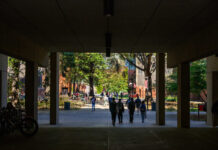In reality, it was a carefully planned emergency preparedness drill to demonstrate how nursing students are ready to respond at a minute’s notice to an immediate and large-scale need for health care services.
The drill was one of the last steps for Ruth Carrico, associate professor of infectious diseases, and her team to complete work on a $250,000 Centers for Disease Control grant. Their work includes development of a curriculum that nursing schools can use to train and mobilize students and a drill that demonstrates their abilities.
“The use of student nurses is endless and of incredible importance to the well-being of any community,” Carrico said.
Students might be called on to help people at shelters following a natural disaster. They could be asked to help in large-scale public immunizations, as UofL students did in 2009.
The drill simulated a mass immunization. Carrico and her team mobilized students every 15 minutes during the course of an hour. She gave students brief training on the situation before they got to work administering “flu vaccines” to the public. Popsicles substituted for the actual vaccine, and there were drill-appropriate substitutes for other portions of the vaccination process.
Everything was designed to “demonstrate whether our notification system works properly and … test students on their ability to arrive onsite in a timely manner, interact effectively with the public and make appropriate decisions related to immunization distribution,” Carrico said.
Carrico now will evaluate the drill using measures that align with Kentucky’s emergency preparedness and response procedures. Her initial impression was favorable.
“This was a very positive experience,” she said. “The nursing students brought their own systems approaches and ideas about how to apply the drill to real-life situations.”
“The take-away (from the drill) is a realization that nursing students are a real resource for communities — they have the knowledge and willingness needed to take part in mass immunization clinics or to help in disaster shelters where immediate health care is needed,” said W. Paul McKinney, associate dean, School of Public Health and Information Sciences. “The goal is to have a pool of nursing students to call upon and render care at a moment’s notice.”
The CDC-funded project is a collaboration of UofL’s schools of Medicine, Nursing, and Public Health and Information Sciences and J.B. Speed School of Engineering; UofL’s Department of Environmental Health and Safety; Sullivan University’s College of Pharmacy; and Bellarmine University’s Lansing School of Nursing and Health Sciences.


























